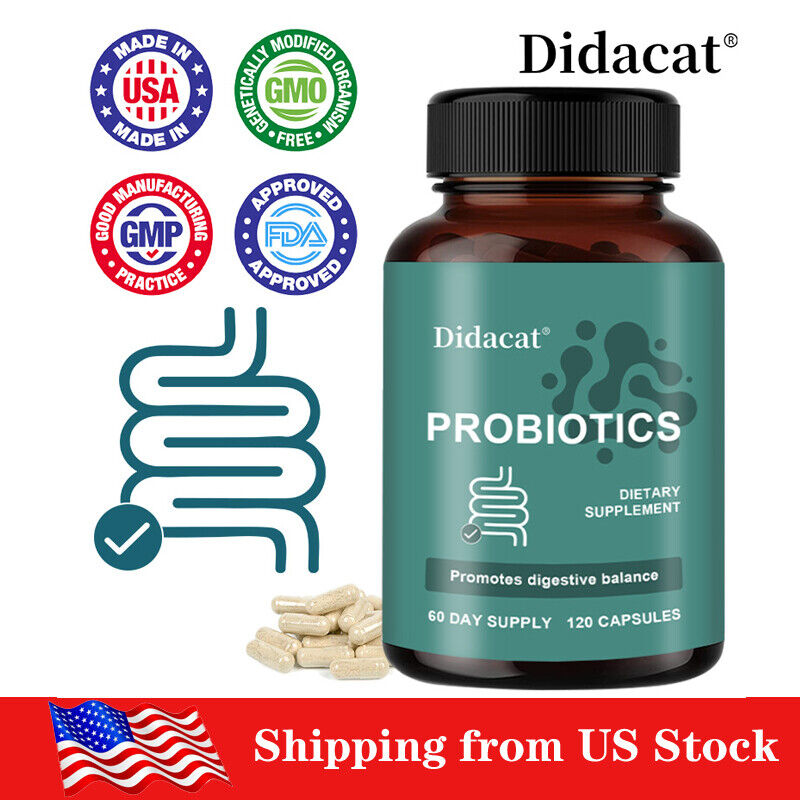Probiotics Benefits + Myths | Improve Gut Health | Doctor Mike

Probiotics, or “good bacteria,” have been gaining popularity in recent years for their supposed benefits for our overall health and well-being.
From improving gut health to boosting the immune system, probiotics have been touted as a cure-all solution. But as with any trendy health trend, there are bound to be myths and misconceptions surrounding probiotics. In this article, we will explore the science behind probiotics and separate fact from fiction.
What Are Probiotics?
Probiotics are live microorganisms that can provide health benefits when consumed in adequate amounts. They are similar to the beneficial bacteria that naturally exist in our gut, also known as the gut microbiome. Probiotics can be found in fermented foods, such as yogurt, kefir, kimchi, and sauerkraut, as well as dietary supplements.
Benefits of Probiotics
The most well-known benefit of probiotics is its ability to improve gut health. Probiotics help maintain a healthy balance of bacteria in our gut, optimizing digestion and promoting regularity. They can also help alleviate symptoms of digestive disorders such as irritable bowel syndrome (IBS), inflammatory bowel disease (IBD), and antibiotic-associated diarrhea.
Furthermore, recent studies have shown that probiotics may have a positive impact on mental health. The gut and brain are connected through the gut-brain axis, and there is evidence that probiotics can influence brain function and even mood. In fact, some researchers have dubbed the gut as the “second brain.”
Probiotics have also been shown to boost the immune system. The gut microbiome plays a crucial role in our immune function, and by keeping it balanced, probiotics can help prevent infections and reduce the severity of allergies and autoimmune diseases.
Additionally, there is increasing research on the potential benefits of probiotics for skin health. Some studies suggest that certain strains of probiotics can help improve conditions such as eczema, acne, and rosacea by restoring balance to the skin microbiome.
Myths About Probiotics
As with any popular health trend, there are also many myths and misconceptions surrounding probiotics. One of the most common myths is that probiotics provide a one-size-fits-all solution for all health issues. This is simply not true as different strains of probiotics have different effects on our body. For example, a strain that can help with bloating may not be as effective in boosting the immune system.
Another myth is that probiotics are harmful to the body. This misconception stems from the fact that probiotics are technically live bacteria. However, the probiotics found in food or supplements are generally safe for consumption. It is essential to purchase probiotics from reputable sources and to consult a healthcare professional before trying a new supplement.
Lastly, there is a belief that probiotics are necessary for everyone, even those without any specific health concerns. While probiotics can be beneficial for overall health, they are not a must-have for everyone. Ingesting more probiotics than necessary can sometimes lead to unwanted side effects such as bloating and gas.
Choosing the Right Probiotic for You
With so many different probiotic products on the market, it can be overwhelming to choose the right one for your specific needs. It is crucial to do some research and read the labels carefully. Look for products that contain specific strains of bacteria that have been proven to be effective for your particular health concerns.
Also, consider the dosage and the number of live bacteria in each serving. The effectiveness of probiotics depends on the number of viable bacteria reaching the gut, so it is essential to choose products that have a high number of live bacteria (often measured in colony-forming units or CFUs). It is also recommended to start with a lower dosage and gradually increase it as your body adjusts.
Probiotics have other benefits besides improving gut health.
Probiotics have been a hot topic in the health and wellness world for some time now. Amidst all the hype, it can be challenging to understand what probiotics are and how they can benefit your gut health. In this article, we’ll examine the benefits and myths surrounding probiotics so you can confidently incorporate them into your dietary routine.
Probiotics are beneficial bacteria that live in our gut and play a crucial role in our digestive health. These microorganisms help break down the food we eat and absorb nutrients, leading to a healthy gut and a strong immune system. Without these good bacteria, we may experience digestive discomfort and an increase in harmful bacteria.
Probiotics have been known to aid in various digestive issues, such as irritable bowel syndrome, inflammatory bowel disease, and diarrhea caused by antibiotics. They also assist in keeping our microbiome, the collection of microbes in our gut, balanced and diverse.
Additionally, probiotics may have other benefits, such as reducing inflammation, enhancing mental health, and improving skin conditions. Studies have shown that probiotics can potentially alleviate anxiety, depression, and stress, leading to a positive impact on mental health. Moreover, recurring skin conditions such as acne and eczema may improve with the help of probiotic supplementation.
However, there are several misconceptions about probiotics that need to be addressed. Firstly, not all probiotics are created equal. There are several strains of bacteria used in probiotic supplements, and each strain has a different potential benefit. Therefore, it is essential to check the label and research the type of strain present in the supplement before consumption.
Secondly, not all probiotics are helpful in every situation. Some individuals may need a higher dosage of probiotics to reach the desired benefits, while others may not see any changes. Additionally, probiotics do not work overnight; consistent use is essential to achieving optimal results.
Lastly, it is essential to consume probiotics as part of a balanced diet and a healthy lifestyle. Finding a good source of probiotics and eating a well-balanced diet is key to receiving the maximum benefit of probiotic supplementation.
To summarize, probiotics are essential for our gut health and overall wellbeing. Incorporating probiotics into our diet can lead to a balanced gut microbiome, reducing digestive issues and improving various aspects of our health. However, it is crucial to understand that not all probiotics are created equal, and it is essential to consume them as part of a balanced diet and a healthy lifestyle. With proper research and guidance from medical professionals, we can confidently include probiotics in our dietary routine and reap the amazing benefits they have to offer.










I Got Tasty Producers To Go Vegan For A Week • Tasty
Cecilia’s Life with Schizophrenia (Living with Hallucinations)
5 Healthy Breakfast Ideas For Weight Loss
We Try Quitting Added Sugar For A Month
Healthy 5 minute Breakfast Ideas for busy people / kid friendly